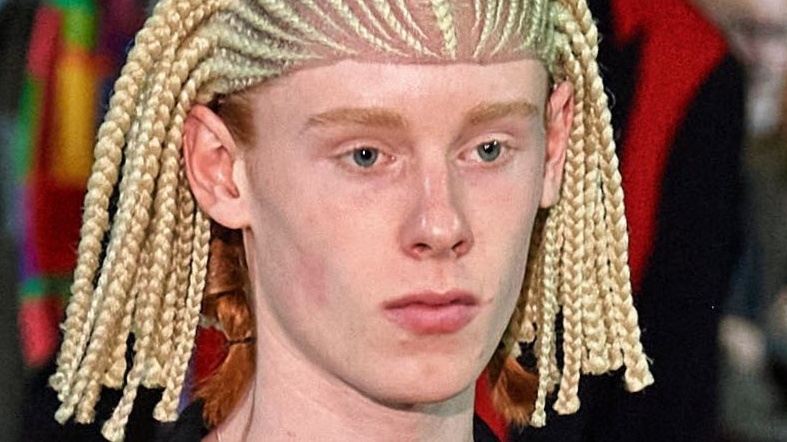Japanese fashion label Comme des Garçons is being called to task for including accessories in a fashion show that some are deeming as cultural appropriation.
While introducing its men's fall/winter 2020 line last week during Paris Fashion Week, some of the male models were seen adorning braided lace front cornrow wigs, reports CNN.
The use of the wigs is causing debate because the hairstyle is often synonymous with Black culture. The male models wearing the wigs were predominantly white. To add insult to injury, the wigs were awkwardly placed on the models' foreheads and didn't flush their natural hairline. Black models with long hair went wigless.
The hairstylist for the show, Julien d'Ys claims the styles were inspired by Egyptian princes.
"Dear all, My inspiration for the comme des garçons show was Egyptian prince A Look I found truly beautiful and inspirational," he wrote in an Instagram post. "A look that was an hommage. Never was it my intention to hurt or offend anyone, ever. If I did I deeply apologize."
Social media is buzzing, and many are not here for the line's explanation and are inquiring as to why such drastic choices were featured in a fashion show. Others are calling it a publicity stunt that has garnered the fashion label what they wanted all along: attention. In this age of heightened racial tensions, blackfishing and illusions forever displayed on social media, many insincere and controversial tactics are being put on the chopping block despite seemingly heartfelt apologies.
lmaoooo why?! y’all this is from comme des garcons pfw fall 2020 men’s collection…. pic.twitter.com/8HtItlIIWg
— TANI (@TANIRICHES) January 17, 2020
It’s 2020 and the fashion industry still doesn’t get what cultural appropriation means ???? .. ?? wow pic.twitter.com/jJwYwmXJCc
— Karabo_ (@Kaaty_xo) January 17, 2020
that's not right and i want explanations for the responsable of this (comme des garçons homme plus fall 2020) pic.twitter.com/8IiSDeE9ZE
— michèle lamy (@Ialamichmich) January 17, 2020
You know comme des garçons planned that shit right? You know they did that off the notion that this would indeed make the internet drag them?
They followed the bad press is still press formula and y’all are still shocked? pic.twitter.com/hLUPwF8nsY
— D'ana del barrio (@itscovl) January 18, 2020
comme des garçons did this as a publicity stunt for attention, I say we don’t give them attention
— no one (@lavstclaire) January 17, 2020
I’ve read 4 COMME des GARÇONS HOMME 2020’ show reviews so far and NONE of the critics mentioned anything about the hair being culturally insensitive.. this industry doesn’t give a shit, they don’t want to challenge anything that may mess up their front row seat ????
— Shelton Griffith (@flyrebel) January 19, 2020
The only thing worse than these cornrows……….. the clothes. We are not rocking comme des garçons in 2020 beloved pic.twitter.com/bsPwVvGVbE
— Ira Madison III (@ira) January 18, 2020
The label has since released an apology, according to Dazed.
"The inspiration for the headpieces for Comme des Garçons menswear FW’20 show was the look of an Egyptian prince. It was never ever our intention to disrespect or hurt anyone – we deeply and sincerely apologise for any offense it has caused," a portion of the statement read.
"The avant-garde Japanese label seemed to have taken a step back with their men’s show, this time putting white models in cornrow wig," fashion watchdog account Diet Prada noted on Instagram.
This isn't the label's first controversial tactic. In 2018, Comme des Garçons was cited for not using Black models. According to Heroine, after investigating the company's past runway shows, less than 10 Black models were found to have been featured.
Comme des Garçons was founded by 75-year-old Rei Kawakubo. The fashion company is estimated to profit $280 million a year, reports The Guardian.
Earlier this month, another iconic fashion label was questioned for its use of elements of Black culture.
"We are a week away from 106th anniversary of the founding of Phi Beta Sigma Fraternity, Inc. and what is plastered all over Social Media? An ad for Polo Ralph Lauren Chino Graphique Droit with the letters that represent Phi Beta Sigma Fraternity, Inc. Greek Letters on the back crease of said pants!" a petition by the members of Phi Beta Sigma Fraternity, Inc read, as Blavity previously reported.
"We are demanding that Ralph Lauren do the right thing and RECALL, DESTROY, & PUBLICLY APOLOGIZE for trying to capitalize off of Black Culture! We don’t know WHO thought that this was a good idea, but they need to fix it quick! Phi Beta Sigma Fraternity, Inc. is a professional organization that [is] not for sale!"
Phi Beta Sigma Fraternity Inc. was founded at Howard University in 1914 by three Black students. Founders A. Langston Taylor, Leonard F. Morse and Charles I. Brown established the organization to render service to the community while creating a space for Black male students who upheld the ideals of brotherhood, scholarship and service.
A spokesperson for the company released a statement to Blavity.
"The use of these symbols on our products was an oversight for which we deeply apologize. We are immediately taking action to remove the product from our sales channels. While we have a rigorous review process in place for all of our designs, this has prompted us to take another review of our protocols to help ensure that this does not happen again," the statement read.
"As an American brand with more than 50 years of heritage, Ralph Lauren is inspired by many facets of American culture. As part of this, we are firmly committed to respectful and appropriate use of all cultural icons and insignias," the statement continued.
It seems Black culture continues to be copied worldwide with little if any credit being given to the originators.

